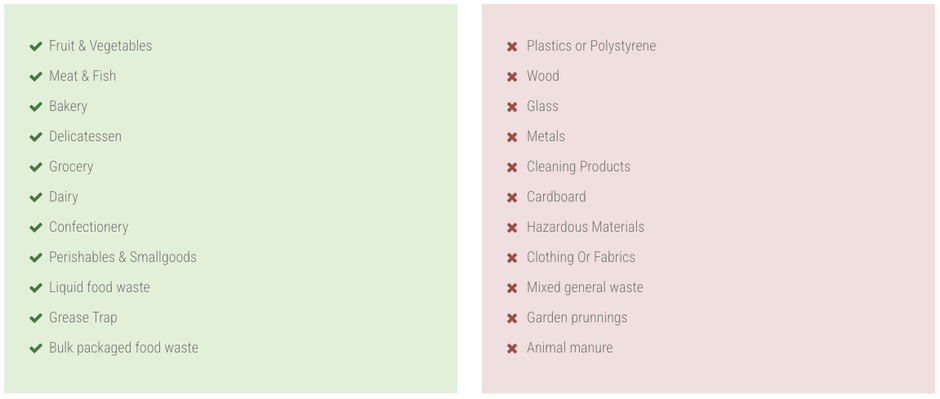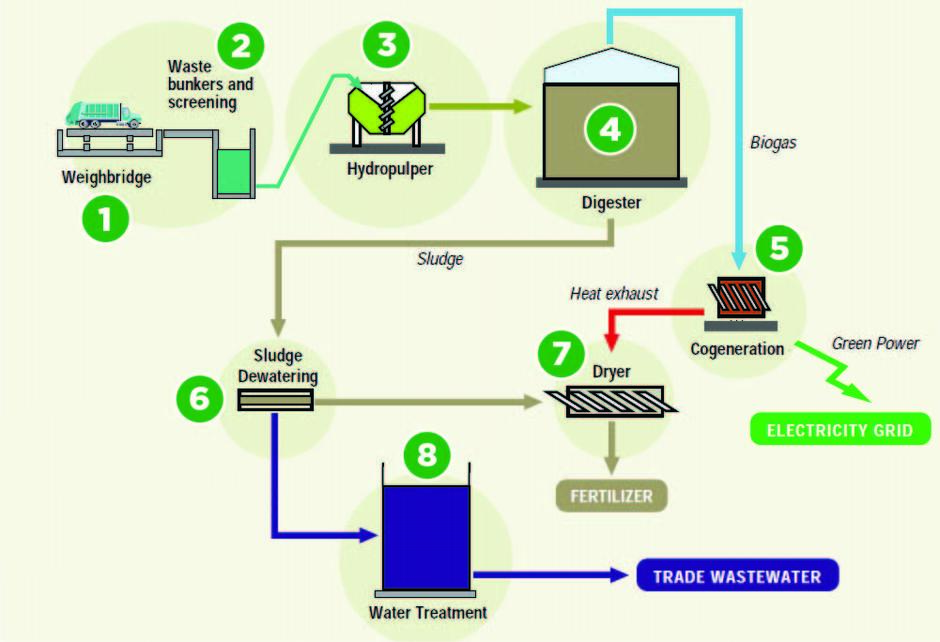Important Update:
Since opening in 2003, the EarthPower facility has provided a viable and valuable solution for businesses looking to divert their organic waste away from landfill. Veolia is committed to continuing this important work, providing customers with sustainable outcomes that better the environment, long into the future.
To enable this, Veolia is undertaking an asset renewal program to upgrade its anaerobic digester process system.
EarthPower: Australia's first food waste-to-energy facility
Earthpower accepts organic waste material from surrounding industrial, commercial, and residential sectors and, through anaerobic digestion, converts the waste into renewable energy while simultaneously producing a nutrient-rich soil improver.
This circular solution recovers the value from waste that would have otherwise been sent to landfill, meaning it reduces greenhouse gas emissions and while creating new value.
EarthPower's Capabilities
EarthPower's operation offers a sustainable, low-cost alternative waste management solution for customers, while supplying local communities with green energy and diverting Sydney's waste away from landfills.
What can EarthPower process?
EarthPower is designed to process five specific waste streams:
- Solid organic waste (with a max inorganic contamination rate of under 5%)
- Organic liquid waste
- Grease trap waste
- Selected packaged waste
- Dehydrated ("spadable") sludge
Acceptable and non-acceptable materials

What does EarthPower produce?
The facility can process 60,000 tonnes of food and garden organic waste per year to produce green energy and soil improver.
The electricity generated by EarthPower is first used to offset the facility's energy needs, then is directed into the local energy grid to help supply surrounding households. At full capacity, this can power approximately 4,000 homes*.
Following digestion and dehydration, the leftover organic matter is collected and granulated to be used as a nutrient-rich soil improver.
How does EarthPower's technology work?
EarthPower's recently upgraded technology offers a state-of-the-art, sustainable solution to recovering value from organic waste.
The facility uses anaerobic digestion to convert solid and liquid food and organic waste into a combustible gas, similar to the function of natural gas.
The digester gas is recovered and used as a renewable fuel source in cogeneration engines to produce green, sustainably-sourced energy. The electricity is then sold to the loca grid for distribution to domestic, commercial, and industrial clients.
A byproduct of the anaerobic digestion process is a nurtient-rich sludge, which is dried and granulated into soil improver that is suitable for commercial sale in agriculture and horticulture.
To minimise energy consumption of the facility, the heat produced by the cogeneration engines is used in the sludge drying process, and to heat the organic digesters.
When compared to other food waste disposal processes such as landfilling and composting, the EarthPower facility offers the most sustainable solution because of its green energy production and conversion of residual organic matter into soil improver for agriculture businesses. This means that there is less reliance on both fossil fuel-sourced energy and synthetic fertilisers, while also avoiding greenhouse gas emissions by diverting the organic waste away from landfilling.
Step 1: Weighbridge
All trucks entering the facility declare their waste source & present on the weighbridge to record weights. Once emptied the truck is weighed out of the facility, giving a net weight.
Step 2: Waste bunkers & screening
All trucks tip into either Pit 1 or Pit 2. Pit 1 being the solid waste receival area and Pit 2 being all liquids & Sludge wastes. Liquids are screened to ensure no contamination
Step 3: Hydropulper
Solid Pit 1 waste is conveyed into the hydropulper using large, turning screw mechanisms. Here, water is added to the solid food waste and agitated at a very high speed. This action strips and tears apart any packaging from the waste, transforming the solid food to a liquid “pulp”. All packaging is extracted and emptied through a chute to a holding bin, then de-watered and sent to Veolia's Woodlawn Eco Precinct.
Once pulped, the food waste is transferred to a holding tank - ready to “feed” the bugs inside the digester.
Step 4: Digester
Home of the bugs, which are continually fed pulped solid and liquid food wastes. This process is called digestion because as the bugs feed they produce methane (biogas). The biogas rises to the top of the tank and is transferred to the cogeneration engines.
Step 5: Cogeneration engines
Biogas is fed into the engine to create green electricity, which is transferred in real-time onto the local energy grid. The energy produced is also used to power the facility itself, making EarthPower entirely self-sufficient.
The engines produce a secondary resource: hot exhaust heat. The exhaust heat from the engines is transferred to a drying plant to assist in making our soil improver.
Step 6: Sludge dewatering
Digested food waste is withdrawn from the digesters and de-watered into a thick sludge, which is then fed to the drying plant.
Step 7: Dryer
The de-watered sludge is transferred into a large barrel, where the excess heat from the cogeneration engines and biogas is utilised to dry the sludge to produce an organic granulated soil improver.
Step 8: Water treatment
Water separated from the digested food waste is treated in the water treatment plant prior to being safely discharged into the trade waste sewer.

Monitoring Data Reports
EarthPower is required to publish pollution monitoring data in regard to its operations.
BIOGAS FLARE
CO-GENERATION EXHAUST STACK
STORM WATER
BIOFILTER EXHAUST STACK
Data references
*Based on electricity consumption data from this document (Table 16) and the following assumptions:
Climate Zone 5 in NSW and Sydney
The two generators (G1 and G3) are running at full data plate capacity = 1,067 + 1,200 = 2,267kW
8,000 run hours per year for each generator (at full capacity, biogas production from digesters allows for the running of two engines at full capacity for 8,000 hours per year)
Then, at full capcity, EarthPower can produce enough energy to power:
1-person households = 5,833; or
2-person households = 4,280; or
3-person households = 2,851; or
4-person households = 2,480; or
5 or more-person households = 2,516
On average, 2.7 people occupy a household in Sydney (Australian Bureau of Statistics 2021)


